|
|
Roy Macdonald |
|
|
|
 |
"I
can't remember how far we drove, but eventually pulled up in a village
street, outside a police house into which they disappeared, leaving me alone
in the car, which was no big thing, as the street was littered with
soldiers, who I presume were the ones who had been searching for us. The
villagers were all standing at their front doors, and when they thought that
no soldiers were looking at them kept giving me "V' signs, putting their
fingers either side of their noses! |
|
|
|
|
Eventually, the two policemen reappeared and who should be between them but
George Darling, the bomb aimer! He sat in the back with me and we were
driven to Nijmegen to the Field Police Office.
There we were sat in chairs in the middle of the room whilst they all got on
with what they were doing, while I carried on dripping water all over the
floor. We were offered no drink at all or anything to eat as far as I
remember.
|
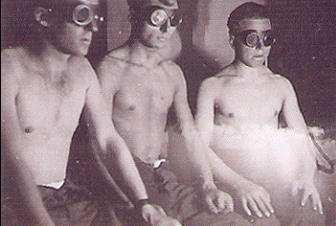
|
|
|
v.l.n.r
Peter Balson, Jim Rogers en Roy Macdonald sunbathing |
|
.About noon, the door opened
to admit another enormous Dutch policeman with a stovepipe hat, and who did
he have with him? non but Don Alexander the rear gunner!! He entered quite
jauntily, and was wearing a blue roll neck pullover and a pair of black
pinstripe trousers, and was carrying a cardboard box under one arm.
The Field Officer in charge
who was seated at his desk looked at the box and said to Alex "Was is los?"
at which Alex plonked the box on his desk, opened the top and said
"Cherries, would you like one!!!" The Officer was not amused, the box was
confiscated and not seen again. |
|
|
|
We just sat there until some
time in the afternoon when we were taken by car again to a barracks in the
town. We got out of the car outside on the road and were met by three
Luftwaffe Officers who repeated the questions about how many engines did our
aircraft have and what target we had bombed, to which they got the usual
shrugs and "we don't know", and so, with a couple of kicks up the backsides
we were led into the barracks and put into a cell with a sloping sort of
bench covered with a palliasse filled with wood shavings. |
|
|
|
There were two other airmen
already in the cell, but we never knew who they were as we were reluctant to
say much just in case they weren't who they seemed to be. All we did was to
tear off our brevets (which indicated what our jobs were on the aircraft)
for no other reason than to frustrate the Germans. We remained in this cell
until about midnight when the door opened and we heard the word which we
were to hear many times in the next two years "Komm." |
|
|
|
So, out we went into the
corridor which had a fully armed soldier every five yards, along to the
entrance hall where there was a group of Officers to whom we were taken. and
who were surrounded by a ring of soldiers who extended out of the door, both
sides of the entrance drive and round a lorry which was waiting at the kerb.
There must have been about fifty armed soldiers altogether, to look after
five bedraggled airmen, and I couldn't help laughing when the senior Officer
said, "Please to understand. Any attempt to escape and you will be shot!! I
remember saying to Alex that we'd have to be bloody Houdini to get out of
this situation. |
|
|
|
We boarded the lorry and were
all seated on a bench with our backs to the cab. Two armed soldiers sat on
either side of the truck, and a Sergeant sat on the tailboard of all places
with a revolver pointed at us all the time. Watching him bump up and down on
the tailboard and the revolver bob up and down was just a little daunting!
Eventually we arrived at an airfield called Uden, where we were put into
solitary cells in a corridor closed off by a real gaol type barred gate.
|
|
|
|
About three o'clock in the
morning my stomach seemed to be in a state of shock, and I realized that
unless I could get to a toilet (the cell contained nothing but a cot) the
situation has all the makings of a disaster. There was an emergency handle
near the door which I pulled, and in due course a guard appeared and I said
to him "Toilet". He looked quite shocked and looked at his watch, tapped it
whilst looking at me and said "Nein, morgen".
Well, I didn't have to be a
German scholar to understand that so I looked at him with what I thought was
an urgent and appealing look and once again said "Toilet". "Nein, nein,
morgen" he repeated and by this time I was getting really desperate so I
raised one leg and blew a tremendous raspberry and said again "Toilet"!!! A
wonderful look of understanding spread over his face and he replied "Ah,
abort, Ja, Komm". Apparently using the word toilet led him to believe that I
just wanted to wash my hands, I ask you, at three in the morning? |
|
|
|
Anyway, we were there for
about a week. No exercise, not allowed out of the cell except when one
particular corporal was on duty. He was a really nice bloke and wore what I
believe was a 1936 Olympic Boxing medal on his right pocket. When he was on
duty, so long as the main barred gate was locked, he would open all the cell
doors and let us mingle and chat, and even gave us his seven cigarettes a
day ration as he didn't smoke! When we eventually left there, he happened to
be on duty, and shook us all by the hand and wished us all good luck. I
really would like to know what happened to him. I hope that he survived. |
|
|
|
We were taken by truck to the
railway station at Boxtel and thence by train to Amsterdam. All the
platforms had been cleared but one unfortunate Dutchman, a big chap but I
think a little weak in the head, was standing at the top of the stairs
looking at us. A sergeant spotted him and with no warning just spun him
round and kicked him down the stairs. We then went by buses to a large
Barracks which apparently was a collection place for aircrew.
|
|
|
|
There I was parted from George
and Alex who I think were put on the ground floor, but had the consolation
of meeting Jim Rogers the Engineer which was a very pleasant surprise. We
had one great pleasure whilst there, which was watching George Darling being
escorted to the toilet which was the other side of the parade ground. As
this was the only exercise George got, he intended to make the most of it,
and did the slowest saunter possible, to the great annoyance of his guard, a
little tiny man with a large rifle, with which he kept poking George to try
to get him to move a little faster. Needless to say, he didn't succeed. I
don't remember how long we stayed in Amsterdam maybe a week. |
|
|
|
Then we were taken by train
to Frankfurt am Main, via Bingen, where we changed trains.
At Bingen, we were all on the platform waiting for the Frankfurt train,
about a hundred of us, when the station master started making a speech to
all the other waiting passengers obviously about us, and they all started to
advance down the platform towards us, headed by the station, master and the
situation began to look rather ugly. Thankfully, the commander of our
escorting guards gave an order and they formed a line, with rifles at the
ready, between us and the civilians, who then decided that was enough and
contented themselves with hurling abuse at us. |
|
|
|
The dis-embarking was a
shambles and we were all mixed up with hordes of people getting off the
train, all of whom seem to have been cherry picking and were loaded down
with baskets of fruit. It was such a crush, and I found myself next to a
little boy who had been separated from his mother. To prevent him being
bustled about I took his hand, which he didn't seem to mind, and walked down
the platform with him, only to hear a shriek and have him grabbed from me by
his irate mother, who must have thought I was going to eat him!!!
|
We were
allied onto one of the central platforms where we became the object of a lot
of silent hatred from the onlookers. Eventually we were led into large
offices in the station and spent the night sleeping on the floor.
. |
|
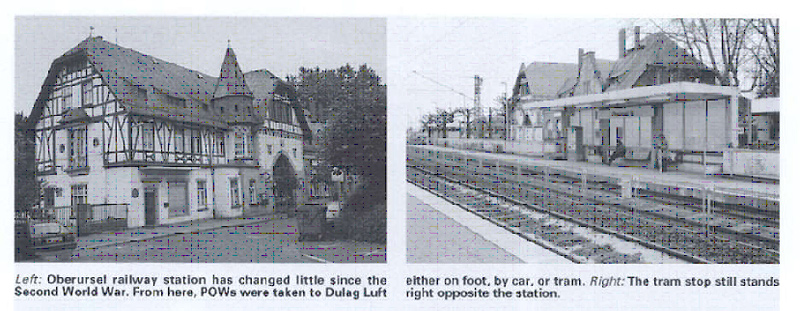 |
|
The first day I was put into a
room along with an American airman who had been shot down in Italy, and
Rogers was in the adjoining room, also with an American. We wondered whether
this was a ploy by the Germans to get us talking to each other about our
different experiences, and whether the rooms were bugged with microphones.
We looked for them without success but nevertheless were guarded in our
conversation. |
|
|
|
The second day I was moved
into another building into a solitary cell, just big enough for a cot bed,
the window barred and not able to be opened, and presented with the so
called "Red Cross" form to fill in. As we were duty bound only to give our
number, rank and name, this form was a joke, wanting to know what our jobs
were in the RAF. what our pay was, what job we had in civilian life, how
much we earned at that, and of course, any information regarding the
squadron and the operation. |
|
|
|
In the afternoon the
interrogator returned and said that I'd left a lot unanswered. When I told
him that number, rank and name was all he was getting, he laughed and said
"You must think we are all stupid. I know that you come from 35 Squadron
from Graveley, and that you have two Flight Lieutenants in your crew." I
made no comment, and nearly burst out laughing when he said quite seriously,
"You know, I think that you were an important designer of aircraft in
civilian life." I just looked suitably gormless and eventually he left.
|
|
Nothing more happened that
day, and about lunch time the next day, a very smart and handsome Luftwaffe
officer came in, and in a friendly manner after giving me a cigarette said:
"There is just one thing which I'm sure you won't mind telling me, how were
you shot down, Flack or fighters.?" When I said I couldn't tell him he
smiled and said that it was that the flack and the fighters had a sort of
competition and like to keep their own scores. |
|
|
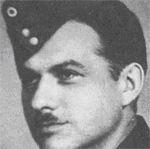 |
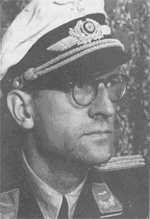 |
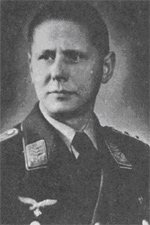 |
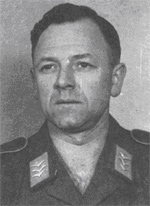 |
|
Hans Scharff |
2e
Leutneant Ulrich Hasmann |
Major
Waldschmidt |
Major
Waldschmidt |
|
|
Bomber crew interrogater |
Bomber crew interrogater |
Fighter Pilot interrogater |
|
|
|
|
I still wouldn't say anything
and he got angry and asked what my job on the aircraft was, and when I was
still silent he grabbed my jacket which was hanging on the corner of the bed
to look at the brevet, which of course was hidden in the palliasse in the
barracks at Nijmegen" . When he saw nothing there he got really mad and told
me he thought I belonged to the 10lst sabotage division, and that if I
didn't tell him the truth I would be taken out in half an hour and shot! I
thought this was a bit much, but kept silent, whereupon he left. |
|
|
Half an hour later the
door opened, "Komm" was the order, and I thought "this is it", but to my
enormous relief I was taken up the corridor with the usual odd kick up
the backside and placed in the compound with all the other prisoners, my
ordeal was over. Then a five day train journey to Lithuania to Stalag
Luft 6 at Heydekrug. Thus started life as Kriegsgefanganer No 206 Stalag
Luft 6.
|
|
|
|
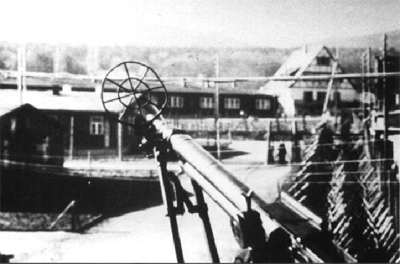 |
View from tower at Stalag Luft VI in Heydekrug
|
| |
|
|
|
Half an hour later the
door opened, "Komm" was the order, and I thought "this is it", but to my
enormous relief I was taken up the corridor with the usual odd kick up
the backside and placed in the compound with all the other prisoners, my
ordeal was over. Then a five day train journey to Lithuania to Stalag
Luft 6 at Heydekrug. Thus started life as Kriegsgefanganer No 206 Stalag
Luft 6."
|
|
Contribution Roy Macdonald, Mid-upper gunner |
|
|
|
|
 |
|
|
|